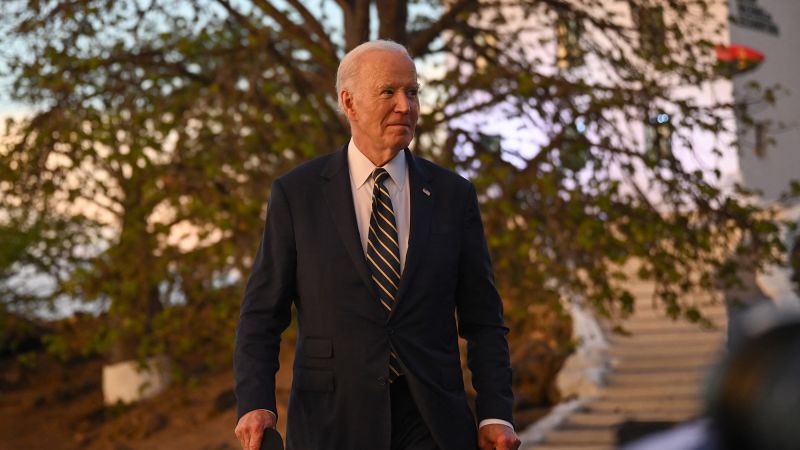
President Joe Biden grinned as he posed for photos with the leader of Angola before departing the country Wednesday, capping off an historic trip that was overshadowed by controversy stemming from Biden’s decision to pardon his son Hunter and unexpected turmoil from a key US ally. Over the three-day trip, the first for an American president, Biden promoted US investment in a massive railway project aiming to ease the transport of critical minerals to global markets as his administration attempts to make lasting inroads on the continent in the face of China’s growing influence. The president acknowledged the horrific history of slavery while speaking in a country that was a major departure point for millions of enslaved Africans to places like America.
And he declared the US as “all-in on Africa” as he finally made good on a two-year promise to visit sub-Saharan Africa. But back in Washington, Biden’s Sunday night announcement that he issued a pardon to his only living son became a major flashpoint as members of his own Democratic Party responded with a flood of criticism. Biden did not answer any questions relating to the pardon despite multiple inquiries by reporters traveling with him.

On the second day of Biden’s trip, the unexpected move by South Korean President Yoon Suk Yeol to declare martial law before reversing course hours later after pressure from parliament also stole the spotlight. The president and US officials were surprised by the decision, leaving his teams in Angola and back in Washington scrambling to determine what was happening and what would come next. While on the trip, Biden did not substantively weigh in on the matter, only briefly telling reporters he would receive a briefing on the situation involving a key US ally.
The president also decided to forgo a formal news conference – an event that used to be standard when a president travels abroad but has become a rarity in the final months of Biden’s presidency. The trip comes as the president is preparing to exit the world stage with President-elect Donald Trump preparing his return as commander-in-chief. Many world leaders are not waiting for Trump’s inauguration to start talks with the president-elect, heading to his Mar-a-Lago estate in Palm Beach, Florida, for meetings or even hosting Trump in their country – as French President Emmanuel Macron prepares to do this weekend for the reopening of Notre Dame Cathedral.
Even as the world turns its eye to Trump, Biden is hoping his moves in Africa could have lasting impact, with a senior administration official saying their strategy could be a “playbook” for future administrations. The Lobito Corridor, which will transport critical minerals from interior countries like Zambia and the Democratic Republic of Congo to ports in Angola and Tanzania, is at the center of the Biden administration’s strategy in Africa. On his final day in Angola, the president toured the port of Lobito, examining American-made General Electric trains used to carry cargo along the railway before meeting with regional leaders for an official Lobito Corridor Trans-Africa Summit.
A senior administration official described the railway project as a “test case” of their approach – trying to surge in American support and financing in a direct way to a specific corridor “where we can have the largest impact,” instead of splitting up funds across a host of countries. Senior administration officials said the corridor will significantly speed up movement of critical minerals, which would be available for export to the US. It currently takes about 45 days for a cargo of cobalt or copper to get from eastern DRC or Zambia to the market by going to Durban, South Africa, by truck.
The railway would significantly slash that shipment time to 40 to 50 hours to go the same distance. “It’s a game-changer. Imagine how transformative this will be for technology, clean energy, for farming, for food security as a whole.
It’s faster, it’s cleaner, it’s cheaper and most importantly, I think, it’s just plain common sense,” Biden said as he met with Angolan President João Lourenço, Democratic Republic of Congo President Felix Tshisekedi, Zambian President Hakainde Hichilema and Tanzanian Vice President Philip Mpango. Biden announced that the US will invest an additional $560 million for projects along the Lobito corridor, from continued infrastructure upgrades to helping build mobile networks. The White House has said those projects will generate at least $200 million in additional private sector commitments.
The US Development Finance Corporation also has approved a $553 million direct loan for the railway. The push comes as the Biden administration has tried to ramp up its work in Africa, including $4 billion in US investments in the Lobito Corridor, as China has built up influence in the continent, leaving the US to play to catch up. Beijing has been a major player in Africa for the past decade through its own Belt and Road Initiative, which has poured hundreds of billions of dollars into railways, highways and other infrastructure projects across the continent.
During a speech at the National Museum of Slavery in Luanda on Tuesday, the president took a swipe at China’s approach, without naming the country, arguing the US presents a better alternative. “The United States understands how we invest in Africa is as important as how much we invest,” Biden said Tuesday. “In too many places, 10 years after the so-called investment was made, workers are still coming home on a dirt road and without electricity, a village without a school, a city without a hospital, a country under crushing debt.
We seek a better way, transparent, high standard, open access to investment that protects workers and the rule of law and the environment. It can be done and will be done,” the president said. The government of Angola, which has worked to move closer to the US under its current president after decades of ties to China and Russia, has played up the US collaboration and investments throughout Biden’s trip.
Large billboards were scattered across the capital of Luanda welcoming Biden, picturing him shaking hands with Lourenço. “Strengthening ties, building bridges,” read one of them. But people like 34-year-old Antonio, who works as a driver in the capital city, don’t think any of the supposed economic gains of a closer partnership with the US will trickle down to the bottom as it will take several years before the Lobido Corridor project will be fully operational.
“People are wondering what is going to come of all of this,” he said. Alexandra, 27, works in an office in downtown Luanda and she, too, is skeptical. “All this fanfare — and we hear the economy is doing better — but people don’t feel it in their wallets,” Alexandra said.
But the Biden administration is hoping the investments the US is making now will pay off for the people of Africa in the years to come. “I think we’re at one of those transition points in world history. What we do in the next several years are going to affect what the next six, seven, eight decades looks like,” Biden said.
“I think this is one of those milestones.” And Biden, whose more than five-decades-long political career is about to come to end, is promising to return to Africa. “I’m coming back to ride on the train all the way, end to end,” Biden said as he wrapped his final event in Angola.
“I like trains a lot, so I’m coming back. You’re stuck with me.”.














